Veteran of the Korean War and POW, Sam Banuelos, visits Fresno Christian Schools and shares stories of perseverance on the 105th Annual Veterans Day, celebrated in high school and middle school chapel, Nov. 7. Local radio host, Paul Loeffler, conducts the live interview, encouraging Banuelos to recall memories that shape his perspective on freedom and responsibility. At the ripe age of 95, Banuelos unfolds how his faith in God and love for America guided his journey home to freedom after two years in Chinese captivity.
As a young boy, Banuelos learned the value of hard work and responsibility to one’s country and family. He grew up in the San Joaquin Valley, moving from Madera to Fresno in his early preteen years. The oldest of ten children, Banuelos withdrew from school after 8th grade to help his father provide for the family. He worked in the fields, harvesting crops such as prunes and garlic.
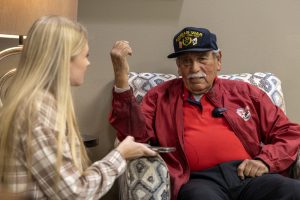
“In the summertime, we used to go to the coast and do farm work, harvesting,” Banuelos said. “You could call us now harvesting technicians, but we enjoyed that kind of life.”
At 20 years old, Banuelos saw on the news that North Korea had invaded South Korea, and he knew to prepare to fulfill his civil duty. On Dec. 15, 1950, he received the call to duty from the president.
“In December, I was on my way over to the Naval recruiting station, but I opened the invitation from the president,” Banuelos said. “They told me, ‘You shouldn’t have opened the letter, now you can’t join the navy, you can join the army if you want to.’ But I had been called, so I would report.”
With his training completed and his arrival in Korea, Banuelos was assigned to the 3rd Infantry Division. He served from 1950-1953 and spent over two years of that time in captivity. In Aug. 1951, Banuelos and his fellow soldiers were on patrol when they were surrounded by the Chinese. They had not been told in time that the Chinese lines had moved forward, leaving six captured and four dead.
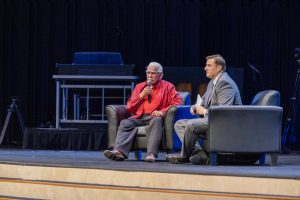
On that first day, Banuelos and the other prisoners were forced to run and walk until 4 a.m. before they were given rest. This was when Banuelos noticed that the damp feeling in his boot was due to the gunshot he had unknowingly received to his toe.
The prisoners were taken from village to village, sleeping on the floors of mud huts and meeting other prisoners in passing.
“I had a buddy from Puerto Rico, we came across a place where there was a prisoner Turk in a giant birdcage. When he saw us, he was very happy and started crying,” Banuelos said. “When they let him out, he jumped with happiness.”
When they reached the internment camp, the prisoners were treated humanely and fed twice a day. Banuelos was thankful to have not experienced the violence he knew occurred in other camps. With humanitarian laws in place, the Chinese captors provided recreational items, such as newspapers, basketballs, musical equipment, etc. to help pass the time. The prisoners would shovel snow in the winter, but mostly spent time inside telling stories and talking.
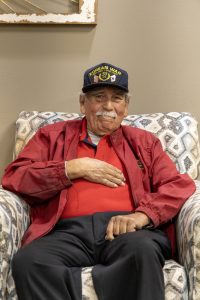
“I had read before I went into service about how North Koreans used to treat prisoners with cruelty, and then when we got caught they told us we were going to be treated with the humanitarian treatment,” Banuelos said. “They had a policy, I think for propaganda purposes, that they called the humanitarian treatment, so I didn’t see any violence, neither on the way over nor the camp. If I had been imprisoned by the Koreans, I do not think I would be here today.”
During his imprisonment, the prisoners’ diet consisted mainly of turnips. The camp had a Hawaiian cook who could prepare them in many different ways. Banuelos lost around 40 pounds during his time in Korea. With a sense of humor, Banuelos shared that he grew fond of turnips and still likes them to this day.
While spending over two years away from home, Banuelos called upon his faith in God and his country to strengthen his hope and endurance.
“I was raised in a Christian family where we had a strong belief in God,” Banuelos said. “I had faith, and I had trust in our country and military, that they would try to save us. I never lost hope that we would someday return to our country.”
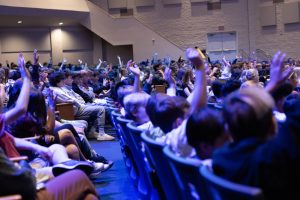
In today’s generation, so far removed from the memories of wars such as this one, the lessons learned and the sacrifices made must be taught and remembered. As many have perceived America today to be divided, veterans call for a return to the fundamental morals that shaped our nation from the beginning.
“I’m a believer in loving your country, and I think we should emphasize this to our young people by example,” Banuelos said. “We must instill in our children a love of country. First of all, love of God: obey God, claim to him, cry to him, speak to him, have faith in him.”
When the prisoners were exchanged in 1953, Banuelos went from hospital to hospital, healing from a lung infection he contracted in captivity. He was finally reunited with his family on Thanksgiving Day, 1953. The look of happiness on his mother’s face is something he will never forget.
“I am a witness to the blessings of God because I believe that God answered the prayers of my mother, and that is why I stand here in the freedom of our country,” Banuelos said.
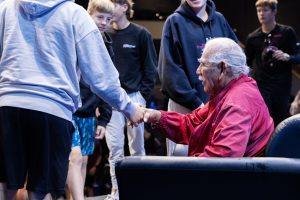
His time in captivity opened his eyes to many things, especially concerning freedom. His national pride and faith are prevalent in his outlook on the events surrounding his time in service.
“There’s nothing like it,” Banuelos said. “Freedom is the best way to live, but we have to protect it. We have to teach our young people to be responsible citizens and do the best they can for their country.”
Junior Gianna Oberti was touched by Banuelos’ journey to freedom.
“He made me want to cry because he was so sweet and funny,” Oberti said. “I’m proud to be an American and learn the stories of the men and women who fought for our country.”
Veterans Day celebrates the bravery of the men and women who fought for the freedom of America; the land of the free, and home of the brave. Opportunities like these enlighten upcoming generations to the archives of stories and knowledge to be learned from those who came before, encouraging them to fulfill their duties to their country.
For more from The Feather visit Beloved soccer coach Sergio Venegas faces health challenges and Candlelight Concert showcases music over production.



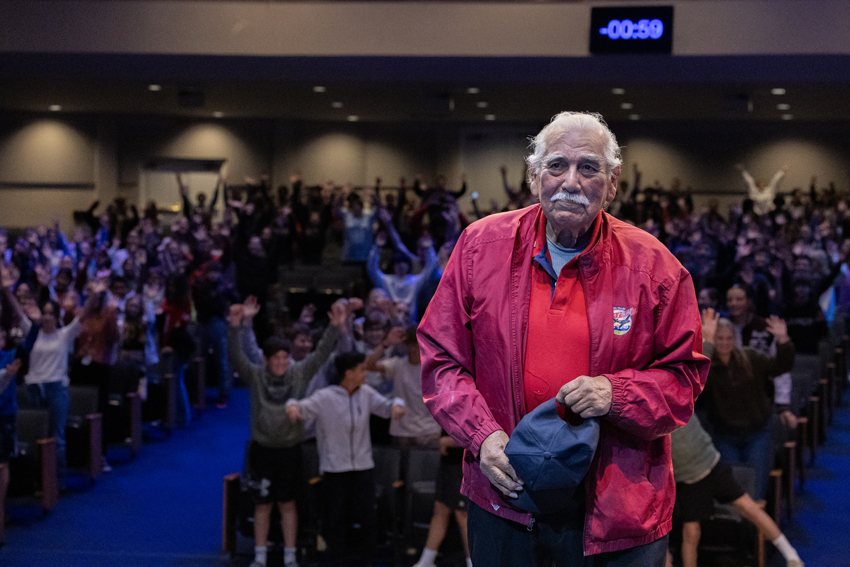




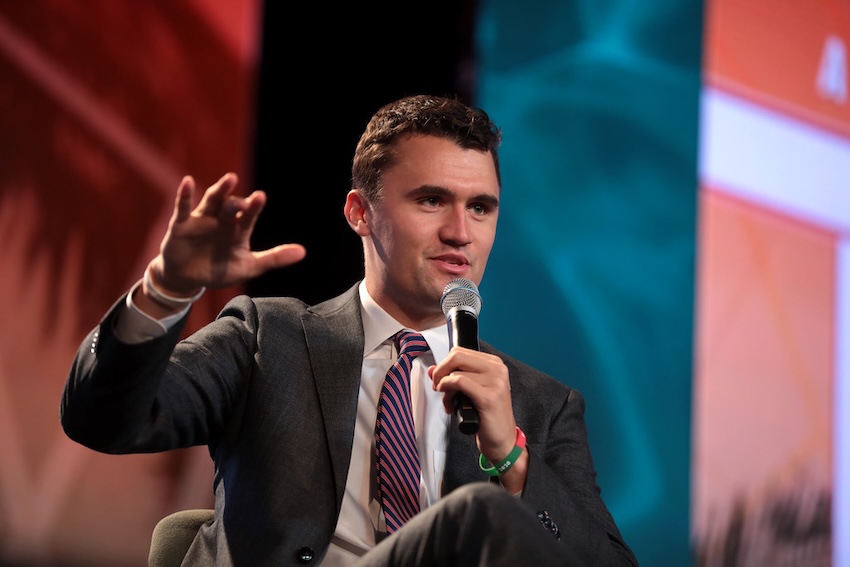
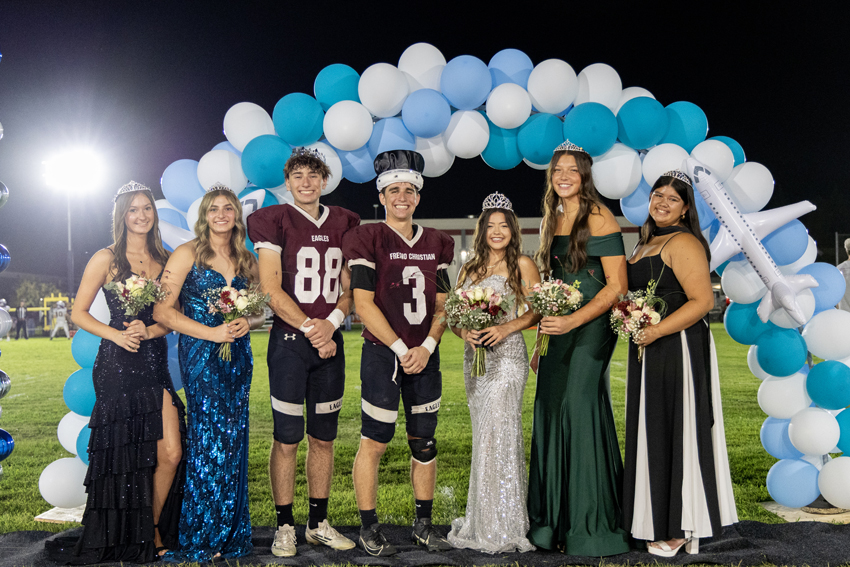
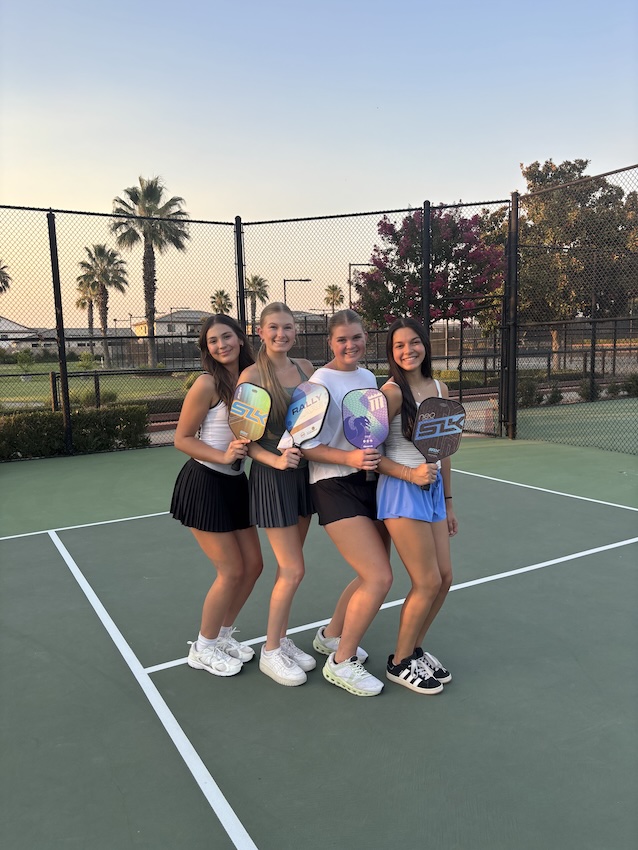
Julianna Briggs • Nov 19, 2024 at 10:36 am
Good Job Delaney! Way to present everything he did for our country.
Tabitha Peters • Nov 18, 2024 at 2:17 pm
Great job, Delaney!